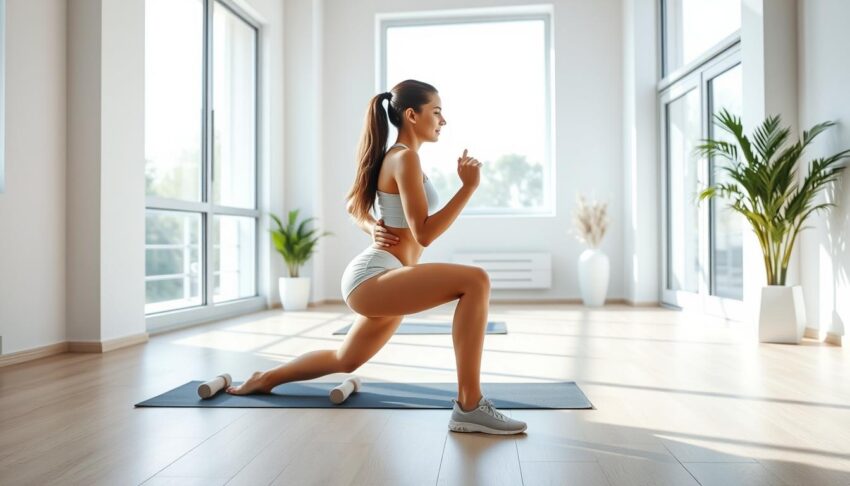Starting a fitness journey can be intimidating, especially for those who are new to exercise or feel they aren’t athletic. However, the truth is that beginning a fitness journey doesn’t require previous experience or a certain level of athletic ability.
It’s about taking small steps towards a healthier lifestyle, focusing on simple exercises that can be incorporated into your daily routine. The key is to start slowly and build consistency, rather than intensity. This approach not only helps in making sustainable lifestyle changes but also fosters a positive relationship with your body.
Our guide is designed to introduce you to various exercise types, helping you discover activities you genuinely enjoy. With a focus on overall well-being for both body and mind, we’re here to support you every step of the way.
Key Takeaways
- Simple exercises can be incorporated into your daily routine to start your fitness journey.
- Consistency is more important than intensity when beginning.
- Fitness is about overall well-being, not just physical appearance.
- Our guide covers various exercise types to help you find enjoyable activities.
- Minimal equipment is required for the beginner-friendly exercises recommended.
Getting Started with FITNESS
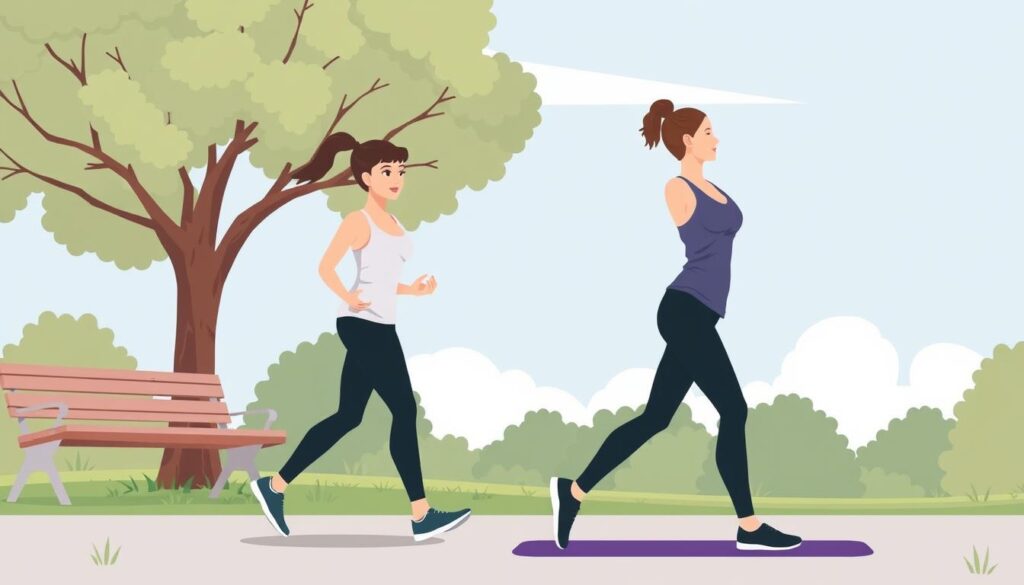
Embarking on a fitness journey can be both exciting and intimidating for beginners. To ensure a smooth start, it’s crucial to lay a solid foundation.
First Steps on Your Fitness Journey
Before diving into any new fitness regimen, especially for those with existing health conditions, consulting with healthcare providers is paramount. This step helps in understanding your body’s limitations and capabilities, ensuring a safe and effective journey.
Setting realistic, achievable fitness goals is the next step. Focus on consistency rather than perfection. This mindset helps in maintaining motivation and tracking progress over time.
Assessing your current fitness level is also essential. Simple self-tests like tracking your walking time or counting push-ups can provide valuable insights. For beginners, starting with a frequency of 2-3 times per week is recommended to avoid burnout and injury.
Fitness should become an enjoyable part of life rather than a chore or punishment. Begin with just 10-15 minutes of activity and gradually increase the duration as your stamina improves.
Proper hydration and basic nutrition principles are vital to support your new exercise habits. Keeping a simple fitness journal can help track your progress and celebrate small victories along the way.
By following these steps, you can create a sustainable and enjoyable fitness routine that enhances your overall well-being.
Benefits of Regular Exercise
Working small, positive steps into your daily life can help you build a healthier life routine. Regular physical activity is a crucial component of this routine.
Physical and Mental Rewards
Engaging in regular exercise can have a profound impact on both physical and mental health. The benefits of regular physical activity are multifaceted, improving overall well-being.
- Regular exercise improves cardiovascular health by strengthening the heart and enhancing circulation, reducing the risk of heart disease.
- Physical activity plays a significant role in weight management through calorie expenditure and improvements in metabolism, helping maintain a healthy weight.
- Exercise releases endorphins, which are known to reduce stress, anxiety, and symptoms of depression, promoting mental well-being.
- Regular physical activity is associated with improved sleep quality, a crucial aspect of overall health and recovery.
- Strength training, a component of exercise, helps maintain bone density and prevent age-related muscle loss, supporting long-term mobility and strength.
- The connection between regular exercise and improved immune system function is well-documented, highlighting the role of physical activity in health defense.
- Physical activity enhances cognitive function and may reduce the risk of neurodegenerative diseases, supporting brain health.
- The benefits of exercise begin immediately, even from the first workout, and continue to accumulate over time, not just after weeks or months.
- Despite the initial expenditure of energy, regular exercise can increase energy levels, combating fatigue and enhancing daily performance.

Essential Equipment for Beginners
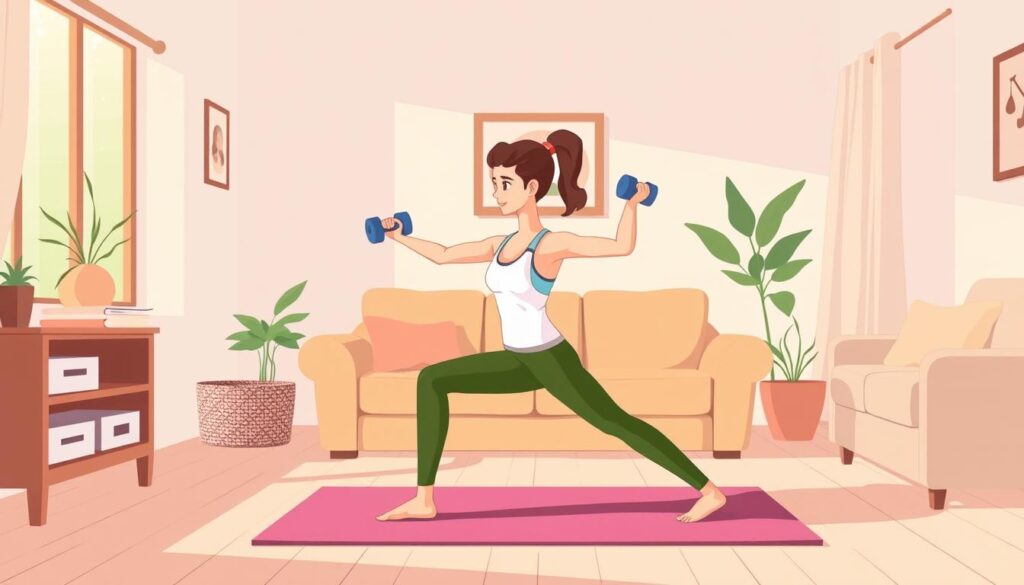
You don’t need to break the bank to get started with fitness; many exercises require minimal or no equipment. The key is to focus on simple, effective tools that enhance your workout without a significant investment.
Budget-Friendly Fitness Tools
For most beginners, the most important initial investment is a pair of comfortable, supportive athletic shoes. These are essential for cardio workouts and can provide the necessary support for various exercises.
Another versatile and affordable option is resistance bands. They offer adjustable resistance, are lightweight, and pack easily for travel, making them perfect for those who prefer working out at home or on the go.
A basic yoga mat is also highly recommended for floor exercises, stretching, and home workouts beyond just yoga. It provides cushioning and grip, reducing the risk of injury.
Interestingly, many household items can substitute for gym equipment. Chairs, stairs, and even water bottles can be used creatively in home workouts, making it easy to get started without any initial investment.
While moisture-wicking clothing can enhance comfort during exercise, it’s not necessary to invest in special athletic wear to get started. What’s more important is finding clothing that makes you feel confident and comfortable.
Lastly, consider the wealth of “equipment” available in the form of fitness apps and online resources. These can guide your workouts, provide motivation, and help track your progress without the need for physical tools.
Starting with minimal equipment and gradually adding pieces as your specific fitness interests develop is a smart approach. This way, you can explore different aspects of fitness without a hefty upfront investment.
For instance, you can explore affordable dumbbells that are perfect for any space. Use discount code FBXPB20 for $20 off an order of $200 or more on high-quality dumbbells designed for durability and performance.
Simple Cardio Workouts
Cardio workouts don’t have to be intimidating; simple exercises like walking or dancing can get you started. Incorporating cardio into your daily routine can significantly improve your heart health and overall fitness.
Effective Cardio Exercises for Beginners
One of the most accessible forms of cardio is walking. It requires no special skills and allows you to adjust the intensity to your comfort level. Interval walking, which involves alternating between a normal pace and brisk walking, is particularly effective for improving cardiovascular fitness.
In addition to walking, there are several simple cardio workouts you can do at home without any equipment. Exercises like jumping jacks, high knees, and marching in place are great ways to get your heart rate up. Moreover, everyday activities such as gardening, dancing, or climbing stairs can also count as cardio exercise, making it easier to fit physical activity into your daily routine.
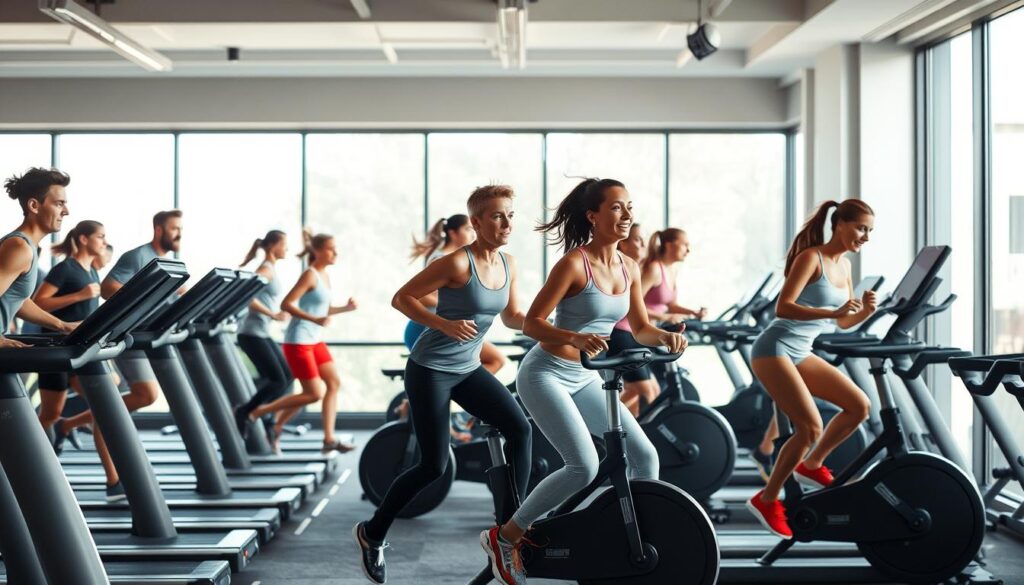
Proper breathing techniques are crucial during cardio workouts to maximize oxygen intake and performance. It’s also important to gauge your intensity appropriately. A good rule of thumb is to exercise at a level where you can still talk but not sing, known as perceived exertion.
“Exercise is a celebration of what your body can do, not a punishment for what you ate.” – Unknown
For beginners, it’s recommended to start with 10 minutes of continuous activity and gradually build up to the recommended 150 minutes per week. For those with joint concerns, low-impact cardio options like swimming or cycling can be excellent alternatives.
- Start with walking or other low-intensity cardio exercises.
- Incorporate interval training to boost cardiovascular fitness.
- Try simple home cardio workouts that require no equipment.
- Use everyday activities as opportunities for cardio exercise.
- Practice proper breathing techniques during workouts.
- Monitor your intensity using perceived exertion.
Basic Strength Training Exercises
Strength training is a cornerstone of a well-rounded fitness regimen, offering benefits that extend beyond mere muscle building. It’s about enhancing your body’s overall health and functionality. With the guidance of certified personal trainers, you can exercise effectively whether you’re at home or on the road.
Effective Strength Training for Beginners
Strength training is crucial for overall body health, not just for building visible muscle. It improves bone density, boosts metabolism, and enhances athletic performance. For beginners, starting with fundamental bodyweight exercises is a great way to build a strong foundation.
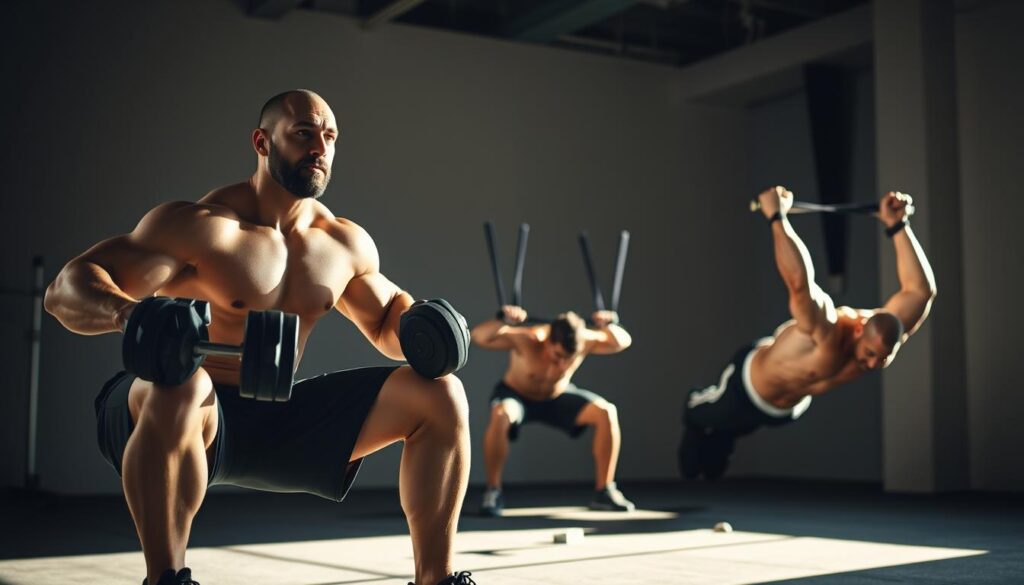
Proper form is essential when performing exercises like modified push-ups, squats, and lunges. These movements work multiple muscle groups and help improve overall strength. For example, a proper squat involves keeping your back straight, engaging your core, and lowering your body until your thighs are parallel to the ground.
- Start with 8-12 repetitions of each exercise, focusing on form rather than quantity.
- Rest days between strength workouts are crucial, allowing muscles to recover and grow stronger.
- Modifications can make common exercises more accessible for absolute beginners.
- Progress exercises gradually by adding repetitions before adding resistance.
It’s also important to understand the concept of compound movements, which work multiple muscle groups simultaneously for efficient workouts. Exercises like squats and lunges are examples of compound movements that can help you build strength more effectively.
Core-strengthening moves like planks support proper posture and reduce injury risk. Holding a plank position for 30-60 seconds can significantly improve your core strength. Muscle soreness is normal after starting strength training, but it should be mild; sharp pain indicates improper form or potential injury.
By incorporating these strength training exercises into your fitness routine, you’ll be on your way to building a stronger, healthier body. Remember, consistency and patience are key to seeing progress and achieving your fitness goals.
Beginner-Friendly Yoga Poses
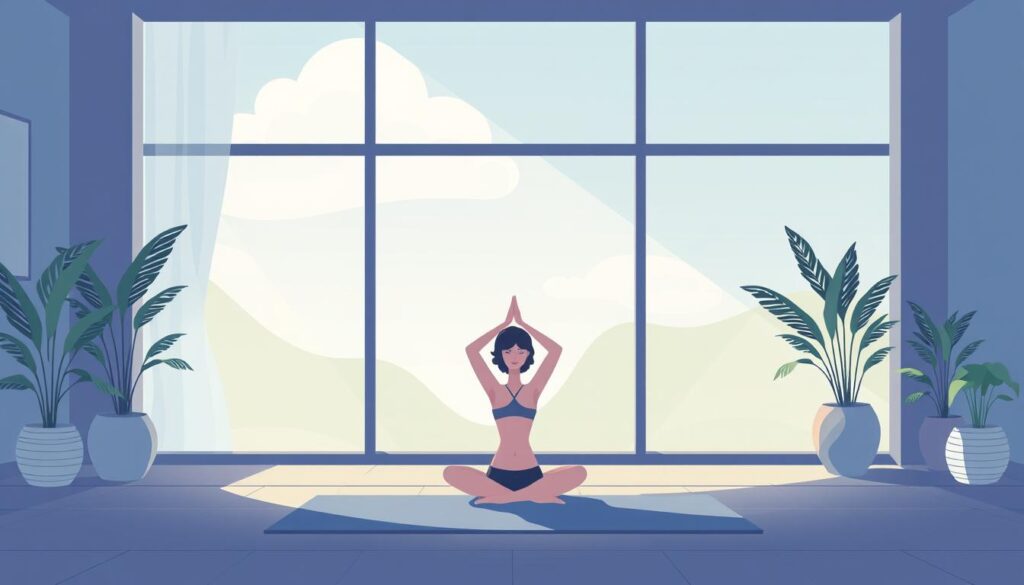
For beginners, yoga offers a gentle and accessible way to improve flexibility, balance, and strength while reducing stress. As a low-impact exercise, yoga is perfect for those new to fitness, providing a foundation for a healthier lifestyle.
Finding Balance and Flexibility
Yoga is both a physical practice and a mindfulness technique that complements other forms of exercise. By incorporating breathing techniques and meditation, yoga enhances the mind-body connection, promoting overall well-being.
The benefits of yoga include improved flexibility, balance, and core strength. Fundamental yoga poses like mountain pose, downward dog, and child’s pose are great for beginners. Proper form and breathing techniques are essential for maximizing the benefits of yoga.
Starting with a 10-15 minute yoga sequence can be practiced daily, even by complete beginners. Props like books, belts, or pillows can be used instead of specialized yoga equipment, making it accessible to everyone. Yoga can be modified for different body types and physical limitations, ensuring that it’s inclusive for all.
Online resources and apps offer free beginner yoga sequences with proper guidance. It’s essential to remember that yoga is not competitive, and beginners should honor their body’s limitations. With regular practice, yoga can become a transformative experience, enhancing overall fitness and well-being.
Creating a Sustainable Fitness Routine
Making exercise a habit is key to sustaining a fitness routine over time. To achieve this, understanding the psychology behind habit formation is essential.
Making It Stick
Research suggests that it takes approximately 21 days to establish a new habit. Consistency is crucial during this period. Scheduling your workouts as non-negotiable appointments in your day is more effective than fitting them in “when you have time.”
Several strategies can help you overcome common obstacles such as time constraints, fatigue, or lack of motivation. One effective method is “habit stacking,” where you attach new fitness behaviors to your existing daily routines.
- Find activities that bring you joy, rather than focusing solely on calorie-burning potential.
- Create a balanced weekly plan that includes different types of exercise for overall fitness.
- Have backup plans for days when your original workout plans aren’t possible.
Gradually increasing your workout duration and intensity can help prevent plateaus. It’s also important to track your progress beyond the scale, such as improvements in energy, sleep quality, or your ability to climb stairs without fatigue.
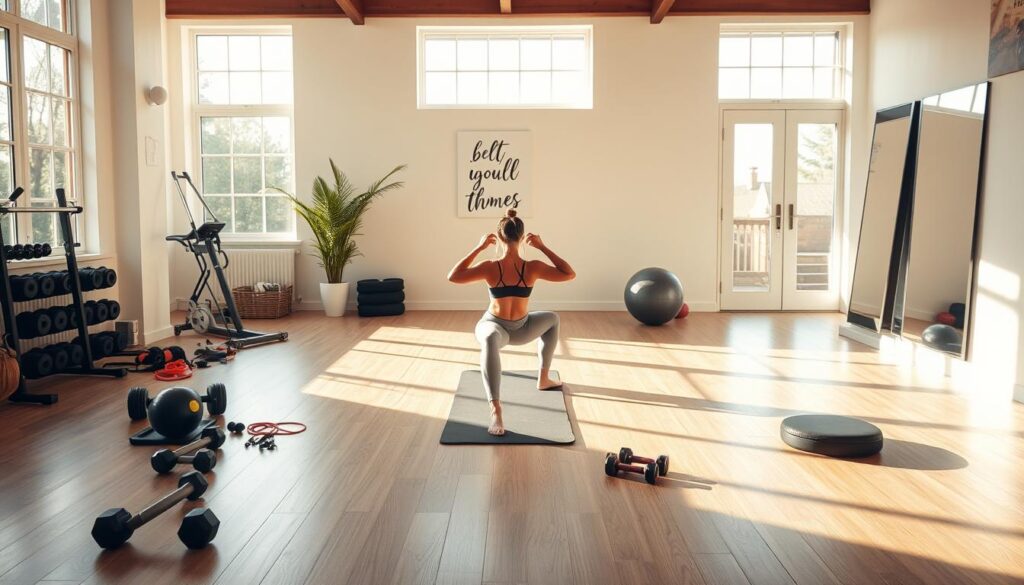
By incorporating these strategies into your daily routine, you can make fitness a sustainable part of your lifestyle, every day.
Finding Support Through Fitness Communities
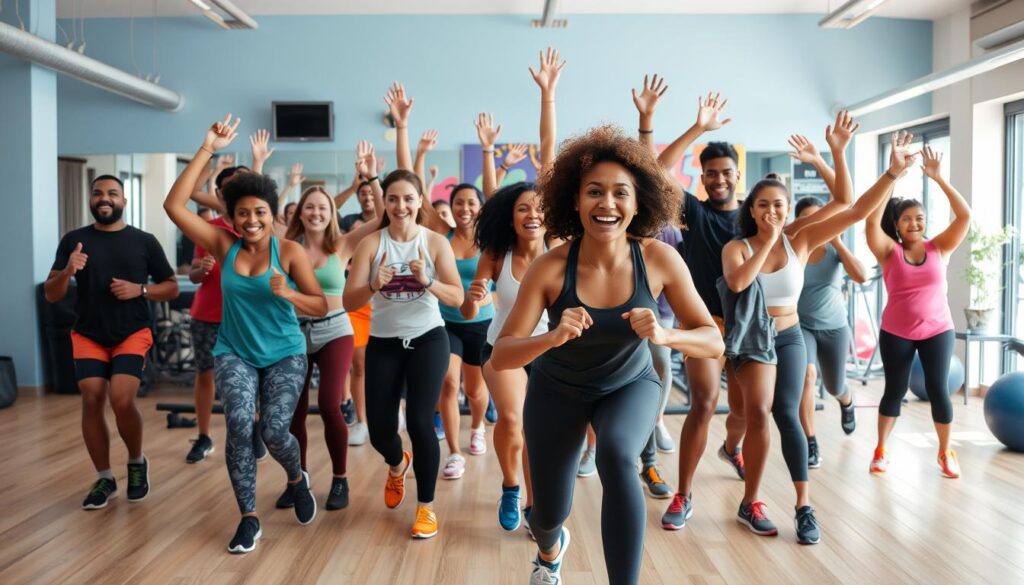
Being part of a fitness community can significantly enhance your workout experience. Social support from like-minded individuals can increase adherence to fitness programs and overall success rates.
Connecting with Like-Minded Beginners
For those just starting out, online fitness communities can be a valuable resource. These platforms provide encouragement, advice, and accountability partners to help you stay on track with your workouts.
Group fitness classes at local gyms are another excellent way to connect with others who share similar fitness goals. Many gyms offer classes specifically designed for beginners, making it easier to get started.
Finding workout buddies in your neighborhood or workplace can also be beneficial. You can motivate each other and make the experience more enjoyable.
Sharing your progress and challenges with others can provide an added motivation during difficult periods. It’s also a great way to celebrate your successes.
Social media platforms can be used to connect with fitness communities while maintaining your privacy and comfort. Joining fitness groups or following fitness influencers can provide valuable insights and motivation.
Working with certified fitness professionals is invaluable, especially when starting out. They can provide proper guidance on form and technique, helping you get the most out of your workouts while minimizing the risk of injury.
When searching for a fitness community, look for inclusive, body-positive spaces that welcome participants of all abilities and sizes. This kind of environment fosters a positive and supportive atmosphere.
While a bit of healthy competition can be motivating, it’s essential to remember that personal progress and well-being should always be the top priority.
Conclusion
Beginning your fitness journey is an exciting step towards a better you. As you’ve learned, getting started with fitness involves understanding its benefits, investing in essential equipment, and finding a routine that works for you.
Key Takeaways for a Successful Start
To recap, we’ve covered the importance of simple exercises for beginners, the benefits of regular exercise on physical and mental health, and how to create a sustainable fitness routine. We’ve also explored various fitness options, including cardio workouts, strength training, and yoga.
Consistency is key to a successful fitness journey. It’s not about being perfect; it’s about making exercise a habit in your daily life. Every journey has its ups and downs, and it’s normal to take breaks, but the important thing is to get back on track.
Start with just one small change today, and you’ll be on your way to a healthier, more active life. Remember, fitness is a lifelong journey that evolves with your changing goals and interests.
We encourage you to share your beginner fitness experiences and questions in the comments below. Commit to your first simple workout today, and celebrate the fact that you’re taking the first step towards a better you.
